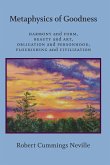The nature of goodness is a philosophical exploration that examines the concept of goodness from psychological and ethical viewpoints. The work seeks to clarify what goodness truly means and how it functions in human life, addressing common misconceptions about the term. The author distinguishes between intrinsic and extrinsic forms of goodness, offering a framework for understanding its role in ethical discussions. The text reflects on the difficulty of defining goodness, acknowledging its complexity and the challenges in interpreting its true nature. By examining the different facets of goodness, the work encourages a deeper reflection on its place within human behavior and moral philosophy. It emphasizes the importance of clarity in discussions about ethics, aiming to help readers engage with the concept more thoughtfully and with greater precision. Through careful analysis, the book invites readers to reconsider their assumptions and gain a more nuanced perspective on goodness, which plays a crucial role in the study of ethics.
Bitte wählen Sie Ihr Anliegen aus.
Rechnungen
Retourenschein anfordern
Bestellstatus
Storno








